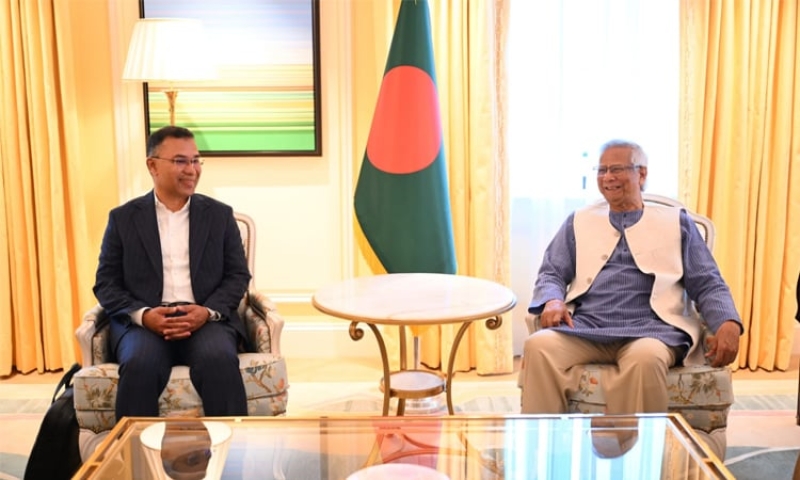- Israel Strikes Tehran with US Support Amid Nuclear Tensions |
- India Sees 9% Drop in Foreign Tourists as Bangladesh Visits Plunge |
- Dhaka Urges Restraint in Pakistan-Afghan War |
- Guterres Urges Action on Safe Migration Pact |
- OpenAI Raises $110B in Amazon-Led Funding |
Yunus–Tarique Rahman Talks Begin in London Amid Tension

A high-stakes political meeting between Chief Adviser Professor Dr. Muhammad Yunus and BNP Acting Chairman Tarique Rahman began in London on Friday, raising hopes for a breakthrough in Bangladesh’s ongoing political crisis ahead of the upcoming general election.
The closed-door meeting started at 2:00 p.m. Bangladesh time (BST) at The Dorchester Hotel, confirmed Chief Adviser’s Deputy Press Secretary Abul Kalam Azad Majumder. It is scheduled to conclude at 4:00 p.m.
The two-hour session—expected to be one-on-one but open to expansion if needed—comes amid rising tensions over the timing of the 13th general election.
National Security Adviser Dr. Khalilur Rahman, along with Press Secretary Shafiqul Alam, received Tarique Rahman upon his arrival at the venue at approximately 1:50 p.m.
According to BNP Media Cell member Sayrul Kabir Khan, Tarique was accompanied by BNP Standing Committee member Amir Khosru Mahmud Chowdhury and International Affairs Adviser Humayun Kabir. They left his London residence around 1:00 p.m.
Several hundred leaders and activists from BNP’s UK Chapter gathered outside the hotel to welcome Tarique upon his arrival.
Meanwhile, Dr. Khalilur Rahman and Amir Khosru held a separate side meeting at the hotel, Majumder said.
BNP Media Cell Convener Dr. Moudud Hossain Alamgir Pavel stated that Amir Khosru would brief reporters on the outcome of the talks between Professor Yunus and Tarique Rahman.
The high-profile meeting has drawn intense attention in Bangladesh, with many viewing it as a potential turning point in the nation's political trajectory.
BNP senior leaders and political analysts believe several key issues are likely to be discussed, including:
-
The election timeline
-
Electoral reforms and the July Charter
-
Justice for victims of the July–August mass uprising
-
A framework for peaceful power transfer
-
Ratification of interim government decisions
-
A dignified exit strategy for the interim administration
-
The potential return of Tarique Rahman after 17 years in exile
“This is a crucial meeting for Bangladesh ahead of the election,” said CA’s Press Secretary Shafiqul Alam. “One leads the interim government; the other heads the country’s largest political party.”
The talks come days after Professor Yunus’s national address, in which he announced that the 13th general election would be held in the first half of April 2025. The BNP rejected the proposed timeline, calling it unilateral and impractical.
Party insiders suggest Tarique Rahman will argue that an April election would conflict with Ramadan, adverse weather, and national exams. A compromise date in January or February may be proposed, depending on the Chief Adviser’s receptiveness.
Another sensitive issue is Tarique Rahman’s potential return to Bangladesh. While there is no official confirmation, BNP leaders and social media speculation point to a possible return before August 5. His security upon return is expected to be a key point of negotiation.
Political analyst Dr. Kazi Mohammad Mahbubur Rahman of Dhaka University warned that the outcome of the meeting could significantly reshape the national political climate. “There is no room for failure. Both sides must act in the national interest and reach a workable solution,” he said.
BNP Standing Committee member Salahuddin Ahmed stated that all major national concerns would likely be addressed in this top-level dialogue—especially setting an election date acceptable to all stakeholders.
He also emphasized the importance of a neutral interim government, respect for the judiciary, national security, and broader democratic principles.
Salahuddin expressed hope that Professor Yunus would consider revising the election schedule in light of practical constraints and political consensus.

